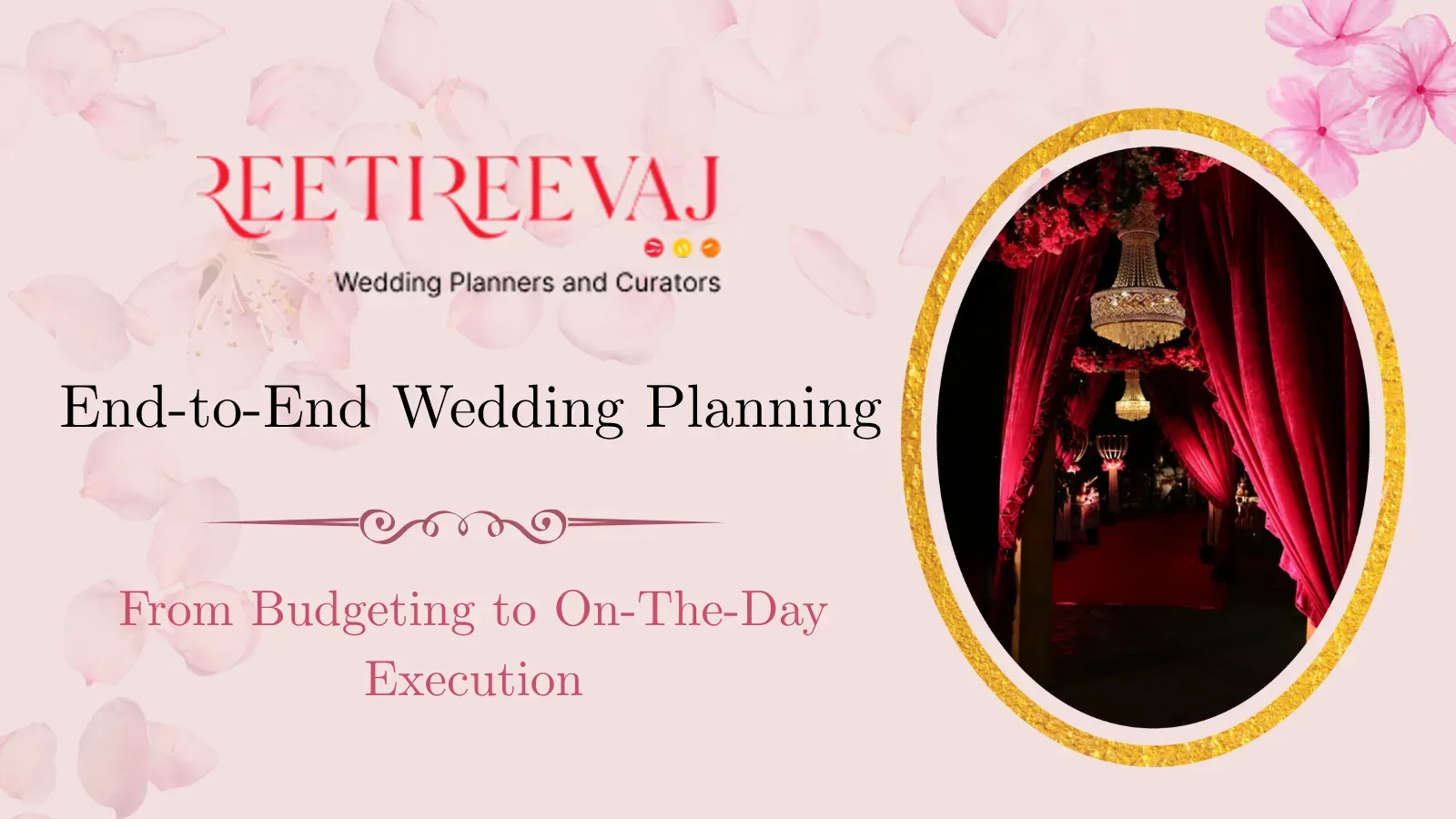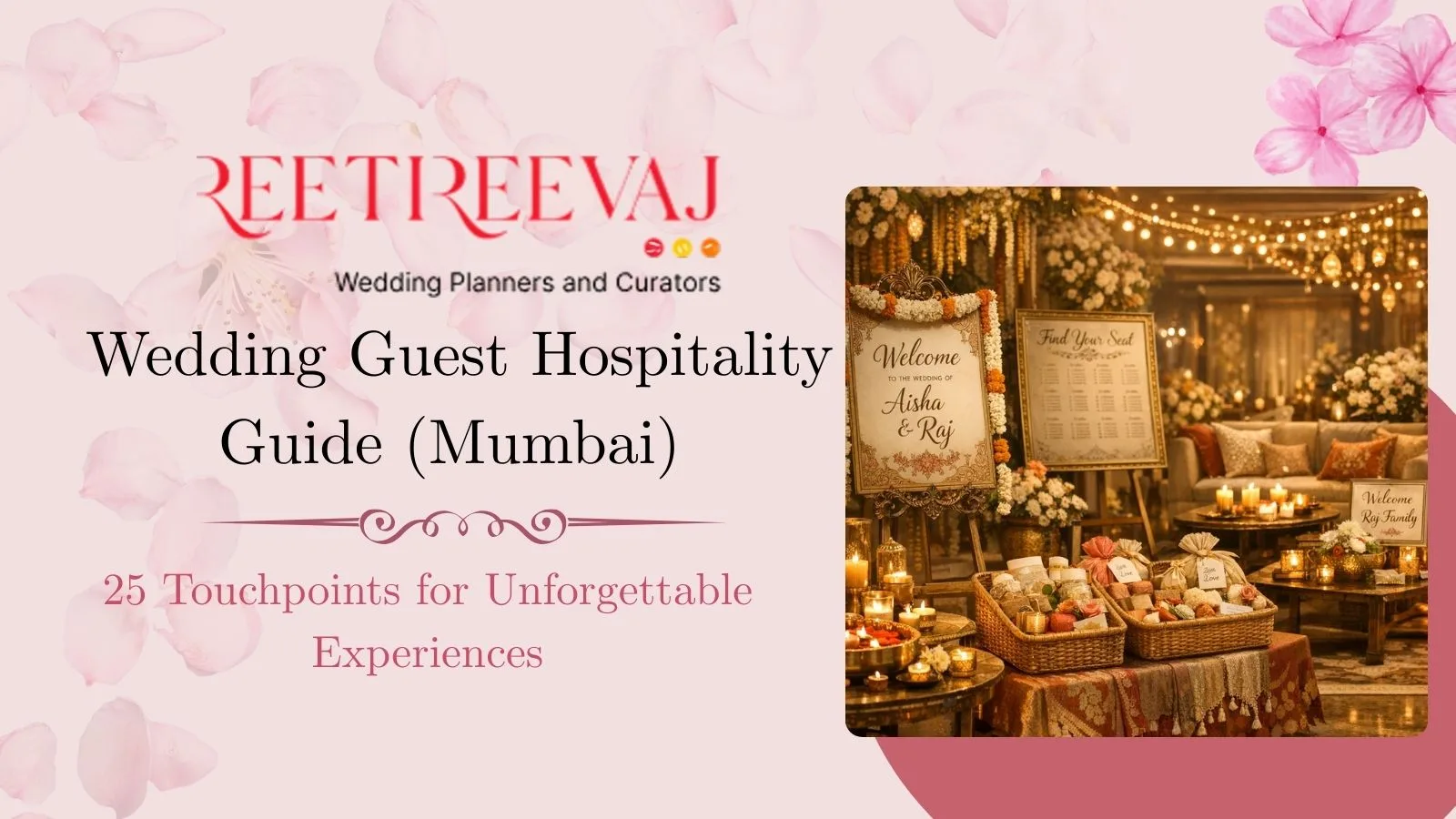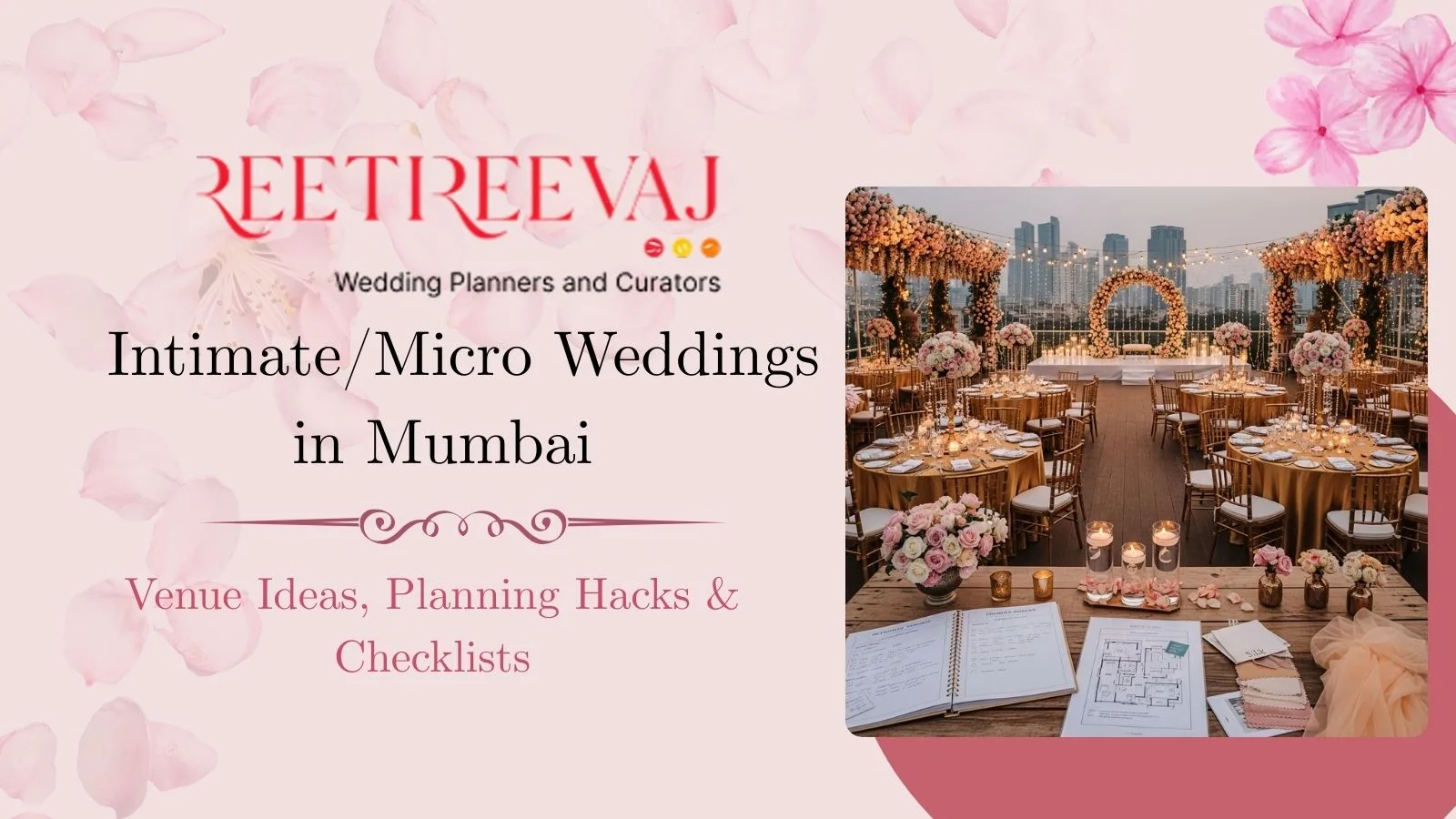
Written by Varsha Kasera, Founder of Reetireevaj – Mumbai’s Premier Wedding Planning Company Last Updated: October 11th, 2025
🎧 Listen to This Blog — Audio Version
Sit back and relax! Let Reetireevaj’s Assistant Voice walk you through —
“End-to-End Wedding Planning: From Budgeting to On-The-Day Execution.”
💬 Perfect for your chai-time, drive-time, or planning-time!
Planning a wedding can feel overwhelming—vendors to book, budgets to manage, and countless decisions to make. What if you could have a seamless journey from the first budget spreadsheet to the last dance of your reception? That’s exactly what end to end wedding planning offers: a stress-free path to your dream celebration.
Whether you’re newly engaged or months into planning, this comprehensive guide will walk you through every stage of creating the perfect wedding day, without the chaos.
What Is End to End Wedding Planning?
End to end wedding planning is a complete service that handles every aspect of your wedding journey—from initial concept development and budgeting to final execution on your big day. Unlike partial planning services that focus on specific elements, this holistic approach ensures every detail aligns perfectly with your vision.
A full-service wedding planner becomes your dedicated partner, managing vendors, timelines, design concepts, and day-of coordination. This means you get to enjoy the excitement of wedding planning while professionals handle the logistics, negotiations, and problem-solving behind the scenes.
Benefits of Comprehensive Wedding Planning
Time Savings: Planning a wedding typically requires 200-300 hours of work. With end-to-end planning, you reclaim your evenings and weekends while experts handle research, vendor meetings, and coordination.
Budget Optimization: Professional planners have industry connections and negotiation expertise that often save you more money than their service fees. They know which investments matter most and where you can smartly cut costs without compromising quality.
Stress Reduction: From managing family dynamics to handling last-minute vendor issues, your planner acts as a buffer, allowing you to actually enjoy your engagement period.
Cohesive Vision: Every element—from invitations to table settings—works together harmoniously when guided by a single creative direction and professional oversight.
Phase 1: Dream Discovery and Budget Planning
Every successful wedding starts with clarity about what matters most to you as a couple. This foundational phase sets the tone for everything that follows.
Defining Your Wedding Vision
Begin by having honest conversations about what your ideal wedding looks and feels like. Is it an intimate garden ceremony with 50 guests or a grand ballroom celebration with 300? Do you envision rustic elegance or modern sophistication?
Create a vision board together—collect images, colors, and ideas that resonate with both of you. This becomes your planning compass, helping you make consistent decisions throughout the process. Share this vision with your wedding planner, who will translate abstract ideas into concrete plans.
Consider what memories you want your guests to take home. Is it incredible food, stunning décor, or an unforgettable entertainment experience? Identifying these priorities early helps allocate resources effectively.
Creating a Realistic Wedding Budget
Most couples spend between ₹15 lakhs to ₹50 lakhs on weddings in India, but your budget should reflect your financial comfort, not industry averages. Start by determining what you can comfortably afford without going into debt.
Budget Breakdown (Typical Percentages):
- Venue and catering: 40-45%
- Photography and videography: 10-12%
- Décor and flowers: 10-15%
- Wedding attire: 8-10%
- Entertainment and music: 5-8%
- Invitations and stationery: 2-3%
- Wedding planning services: 10-15%
- Contingency fund: 5-10%
Build in a contingency fund—unexpected costs always arise. A good planner helps you understand where you can flex and where you should invest based on your priorities. They also know hidden costs that couples often overlook, like vendor meals, overtime charges, or transportation logistics.
Timeline Development
Ideally, start planning 12-18 months before your wedding date for full-service planning. This timeline allows you to secure your preferred vendors, especially for peak season dates (October through March in India).
Your planner will create a customized timeline with key milestones: when to book the venue, send invitations, finalize the menu, and complete each planning phase. This roadmap keeps everything on track without last-minute scrambles.
Phase 2: Vendor Selection and Management
Choosing the right vendors can make or break your wedding experience. This is where professional wedding planners truly shine—their expertise and industry relationships become invaluable.
The Essential Vendor Team
Venue: Your location sets everything in motion. Consider guest count, season, accessibility, and whether it aligns with your vision. Your planner can arrange site visits, negotiate contracts, and identify potential challenges before you commit.
Catering: Food creates lasting memories. Whether you want traditional multi-cuisine menus or contemporary fusion, your caterer needs to deliver quality for your guest count. Taste testing sessions, dietary accommodation planning, and service style decisions all require careful coordination.
Photography and Videography: These professionals capture your memories forever. Review portfolios carefully, discuss your must-have shots, and ensure their style matches your aesthetic. Your planner coordinates their timeline and ensures they have access to key moments.
Décor and Design: From mandap designs to table centerpieces, your decorator transforms spaces into your vision. Detailed mock-ups, color consultations, and setup timelines require close collaboration.
Entertainment: Whether it’s a DJ, live band, or traditional performers, entertainment sets your celebration’s mood. Your planner ensures sound checks, timing coordination, and backup plans are in place.
Vendor Coordination Benefits
Professional planners maintain ongoing communication with all vendors, ensuring everyone works from the same timeline and understands their responsibilities. They handle contract reviews, payment schedules, and problem resolution, so you never worry about miscommunication or dropped details.
When vendors know they’re working with an experienced planner, they often elevate their service level. The professional accountability creates better outcomes for your wedding.
Phase 3: Design and Personalization
Your wedding should tell your unique love story. This phase transforms logistics into an experience that feels authentically yours.
Creating Your Wedding Aesthetic
Working with your vision board, your planner develops a comprehensive design concept covering color palettes, textures, lighting, and decorative elements. This includes everything from invitation design to napkin colors—every detail contributes to your overall aesthetic.
Consider seasonal elements that enhance your theme. A winter wedding might incorporate rich jewel tones and warm lighting, while a summer celebration could feature lighter colors and outdoor elements. Your planner ensures design choices work practically with your venue and season.
Personalization Touches
The most memorable weddings include personal elements that reflect the couple’s journey. This might be:
- Custom cocktails named after significant moments in your relationship
- Photo displays showcasing your journey together
- Favors that represent your heritage or shared interests
- Ceremony elements that honor family traditions while adding modern touches
- Entertainment that reflects your personalities
Your planner helps identify meaningful personalization opportunities and coordinates their execution. These touches transform a beautiful wedding into YOUR wedding.
Cultural and Traditional Integration
For many couples, honoring cultural traditions while adding contemporary elements creates the perfect balance. An experienced wedding planner understands various cultural ceremonies and knows how to weave traditional elements seamlessly with modern celebrations.
Whether you’re planning a multi-day celebration with separate functions or incorporating specific rituals into your ceremony, proper guidance ensures cultural authenticity while maintaining your personal style.
Phase 4: Guest Experience Planning
Your guests’ experience extends far beyond the ceremony and reception. Thoughtful planning ensures they feel welcomed, comfortable, and part of your celebration.
Invitation Strategy
Invitations set expectations for your wedding style. Your planner coordinates with designers to create invitations that match your aesthetic while communicating essential information clearly. This includes save-the-dates, formal invitations, itinerary cards for multi-day events, and RSVP tracking systems.
Digital invitation components, wedding websites, and RSVP management tools streamline guest communication. Your planner ensures all information—from dress codes to accommodation options—is easily accessible.
Accommodation and Transportation
For destination weddings or celebrations with many out-of-town guests, accommodation coordination becomes crucial. Your planner can negotiate hotel blocks, arrange transportation between venues and hotels, and provide guests with area information and recommendations.
Transportation logistics include arranging vehicles for the wedding party, coordinating guest shuttles, and ensuring elderly or differently-abled guests have appropriate accommodation.
Guest Comfort Considerations
Small touches create big impressions. Welcome bags for out-of-town guests, clearly marked seating arrangements, comfortable ceremony seating, and weather contingencies (fans for summer weddings, heaters for winter events) show thoughtfulness.
Your planner anticipates guest needs you might not consider: adequate restroom facilities, charging stations for phones, designated areas for parents with young children, and dietary options that accommodate various restrictions.
Phase 5: Final Month Preparations
As your wedding date approaches, details intensify. This is when having a dedicated planner becomes most valuable—they manage the acceleration while you stay focused on enjoying your final weeks as an engaged couple.
Confirming All Details
Your planner conducts final confirmations with every vendor: menu selections, décor specifications, timeline reviews, and payment schedules. They create a comprehensive day-of timeline that coordinates every vendor’s arrival, setup, and responsibilities.
Seating charts require finalization based on final guest counts. Your planner handles this puzzle, considering family dynamics, social connections, and any special seating requirements. They also coordinate escort card printing or display creation.
Rehearsal Coordination
The wedding rehearsal typically happens 1-2 days before your wedding. Your planner orchestrates this practice run, ensuring everyone in the wedding party understands their processional order, positioning, and responsibilities. This reduces ceremony day nervousness significantly.
Family members and friends with specific roles (reading passages, performing rituals, giving toasts) receive clear instructions and timing guidance. This preparation ensures smooth ceremony flow.
Emergency Preparedness
Professional planners prepare for contingencies: backup vendors, weather alternatives for outdoor elements, emergency kits with everything from safety pins to pain relievers, and solutions for common last-minute issues.
They create contingency plans you hope never to use but appreciate having in place. This includes backup timeline versions for delays, indoor alternatives for outdoor spaces, and solutions for vendor no-shows (though rare with professional teams).
Phase 6: The Wedding Day Execution
Your wedding day should be about celebrating love, not managing logistics. This is where end-to-end planning truly delivers its value—you experience your wedding as a guest would, while your planner orchestrates everything behind the scenes.
Morning Coordination
Your planner arrives early to oversee vendor arrivals and setup. They verify that décor matches approved designs, catering stations are properly positioned, and technical elements (sound, lighting) function correctly. They troubleshoot any issues before you even arrive at the venue.
For the wedding party, your planner coordinates getting-ready timelines, ensures hair and makeup stay on schedule, and facilitates photography during preparation hours. They handle vendor payments, tip distribution, and any last-minute vendor questions.
Ceremony Management
During the ceremony, your planner manages processional timing, coordinates with musicians or DJs for music cues, and ensures all participants know their roles. They’re positioned to handle any unexpected situations—late guests, technical issues, or emotional moments requiring tissues.
They also coordinate post-ceremony activities: receiving line flow, transition to cocktail hour, and any cultural rituals or family photo sessions. This seamless transition keeps guests engaged and comfortable.
Reception Execution
Throughout the reception, your planner manages the timeline: when to invite guests to dinner, speech sequencing, cake cutting timing, and first dance coordination. They work closely with your DJ or bandleader to ensure smooth transitions between program elements.
They also monitor guest comfort: ensuring food service runs smoothly, addressing any guest concerns or questions, coordinating guest book or favor distribution, and handling any unexpected situations discreetly. You remain blissfully unaware of any behind-the-scenes problem-solving.
End-of-Night Logistics
As the celebration concludes, your planner coordinates guest departures, ensures transportation operates smoothly, and oversees venue breakdown according to contract terms. They secure important items (gifts, décor pieces you’re keeping, personal belongings) and ensure nothing gets left behind.
They handle final vendor coordination, verify all contracted services were delivered, and ensure the venue is left in appropriate condition. You leave your wedding focused solely on beginning your married life together.
Why Choose Professional End to End Wedding Planning
While some couples choose DIY planning or partial services, comprehensive wedding planning offers distinct advantages that often justify the investment.
Expertise and Experience
Professional planners have coordinated dozens or hundreds of weddings. They’ve encountered virtually every scenario, know which vendors deliver reliably, and understand how to prevent common mistakes. This expertise saves you from expensive learning curves.
They stay current with trends, new vendors, and innovative ideas while understanding timeless elements that create beautiful weddings. This balance of fresh inspiration and proven practices creates exceptional results.
Vendor Relationships and Negotiation
Established planners have strong vendor networks built over years of collaboration. These relationships often result in priority booking, better pricing, and enhanced service. Vendors know their reputation depends on performance for planner-coordinated events.
Planners also understand contract language and negotiation strategies. They ensure you get fair pricing, clear deliverables, and appropriate cancellation or modification terms.
Stress Management and Emotional Support
Wedding planning involves emotional decisions, family dynamics, and logistical challenges. Your planner provides objective guidance, mediates conflicts diplomatically, and keeps everyone focused on the ultimate goal: a beautiful celebration of your love.
Having someone dedicated to managing details allows you to stay present during your engagement period rather than drowning in spreadsheets and vendor emails.
Choosing the Right Wedding Planner
Not all wedding planners offer the same level of service or expertise. Selecting the right partner requires careful consideration.
What to Look For
Portfolio and Experience: Review their previous work to ensure their aesthetic aligns with your vision. Ask about their experience with weddings of similar size, style, and cultural requirements.
Communication Style: You’ll work closely with your planner for months. Ensure their communication style matches your preferences—some couples want detailed updates, while others prefer check-ins only for major decisions.
Service Scope: Clarify exactly what’s included in end-to-end planning. What does their coordination cover? Are design services included or additional? How many vendor meetings will they attend with you?
References and Reviews: Speak with previous clients about their experience. Were they responsive? Did they handle problems well? Did the wedding day execute smoothly?
Chemistry: Trust your instincts. The right planner feels like a partner who understands your vision and respects your preferences.
Investment Considerations
Professional end to end wedding planning typically costs 10-15% of your total wedding budget. While this seems significant, consider the value: time savings, vendor discounts, stress reduction, and the peace of mind that professionals handle every detail.
Many couples find that planners save them more money through vendor negotiations and budget optimization than the planning fee costs. The real value, however, is the experience—actually enjoying your wedding journey and celebration.
Start Your Perfect Wedding Journey
End to end wedding planning transforms what could be a stressful marathon into an exciting, enjoyable journey toward one of life’s most significant celebrations. From initial budgeting to the last moment of your reception, professional guidance ensures nothing falls through the cracks while you focus on what truly matters: celebrating your love story.
The difference between a good wedding and an exceptional one often lies in the details—the seamless transitions, the thoughtful guest experiences, the cohesive design, and the flawless execution that happens when experienced professionals orchestrate every element.
Ready to begin planning your dream wedding without the stress? Discover how Reetireevaj creates unforgettable wedding celebrations with our comprehensive end-to-end planning services. Let’s transform your vision into a beautiful reality—every detail, perfectly executed.
Frequently Asked Questions About End to End Wedding Planning
How far in advance should I hire an end-to-end wedding planner?
Ideally, book your wedding planner 12-18 months before your wedding date. This timeline allows you to secure preferred vendors, especially during peak wedding season (October to March). However, many planners can accommodate shorter timelines—even 6-9 months out—though vendor availability may be more limited. The earlier you start, the more options you’ll have and the less stressful the planning process becomes.
What's the difference between end-to-end planning and day-of coordination?
End to end planning covers your entire wedding journey from initial concept and budgeting through execution day. Your planner manages vendor selection, contract negotiations, design development, timeline creation, and all coordination. Day-of coordination, in contrast, starts about 4-6 weeks before your wedding. The coordinator executes your existing plans and manages vendors on the wedding day, but you’ve handled all the planning and vendor selection yourself. End-to-end planning is comprehensive, while day-of coordination focuses solely on execution.
Can I still make decisions if I hire an end-to-end planner, or do they control everything?
Absolutely—you remain in control of all major decisions. Your wedding planner is your partner and advisor, not a dictator. They present options, provide expert recommendations, and guide you through decisions, but final choices are always yours. They handle the logistics, vendor management, and problem-solving so you can focus on the enjoyable aspects of planning. Think of them as your expert guide who makes the journey easier while you steer the direction.
Is end to end wedding planning worth the investment for smaller weddings?
Yes, comprehensive planning benefits weddings of all sizes. Smaller weddings (under 100 guests) still require vendor coordination, timeline management, design cohesion, and day-of execution. In fact, intimate weddings often involve more personalized details that require careful coordination. The time savings, stress reduction, and professional expertise remain valuable regardless of guest count. Many planners offer scaled packages that suit different wedding sizes and budgets
How do end-to-end planners handle unexpected problems on the wedding day?
Experienced planners excel at anticipating and solving problems invisibly. They arrive early to identify and resolve issues before you see them, maintain emergency kits with common necessities, have backup plans for weather and vendor issues, and maintain calm during unexpected situations. Most couples never know when problems occur because their planner handles everything behind the scenes. This problem-solving ability is precisely why professional planning proves so valuable—you enjoy your day while they ensure everything runs smoothly.



